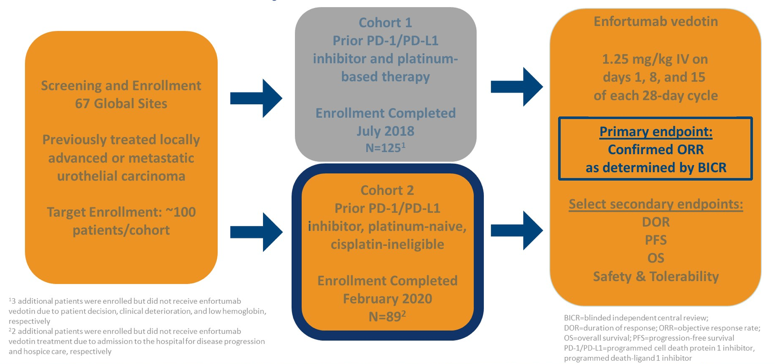EV-201 is an open-label, multicenter, multinational study in which patients received 1.25 mg/kg EV on Days 1, 8, and 15 of each 28-day cycle. The EV-201 trial design is as follows:

The primary endpoint was confirmed objective response rate per RECIST 1.1 by blinded independent central review, and secondary endpoints were duration of response, progression-free survival, overall survival, and safety.
As of September 8, 2020, the data cutoff date for the primary analysis, 91 patients were enrolled and 89 treated in cohort 2. Patients were elderly (median age of 75 years, range: 49-90) with comorbidities, including moderate/severe renal impairment. Patients were cisplatin-ineligible at study entry due to CrCl < 60 mL/min (66%), Grade ≥2 hearing loss (15%), or ECOG PS 2 (7%); an additional 12% of patients met ≥1 criterion. The primary tumor site was in upper tract in 43%, 79% had visceral metastases, including 24% with liver metastases. The median treatment duration was 6.0 months (range: 0.3 – 24.6), and at data cutoff 82% of patients had discontinued treatment. Confirmed objective response per blinded independent central review was 52% (95% CI 40.8–62.4), including a 20% complete response rate among treated patients.

Responses were observed across all subgroups, including patients with primary tumor sites in the upper tract (ORR 61%), those with liver metastasis (ORR 48%), and those who did not response to prior PD-1/PD-L1 inhibitors (ORR 48%). The median duration of response was 10.9 months (95% CI 5.8–NR). Over a median follow-up of 13.4 months, the median progression free survival was 5.8 months (95% CI 5.0-8.3) and median overall survival was 14.7 months (95% CI 10.5-18.2):

The most common all-grade treatment-related adverse events were alopecia (51%), peripheral sensory neuropathy (47%), and fatigue (34%). Treatment-related adverse events of interest included rash (61% all grade, 17% ≥ grade 3), peripheral neuropathy (54% all grade, 8% ≥ grade 3), and hyperglycemia (10% all grade, 6% ≥ grade 3). Four deaths were reported as treatment related by investigators, all in pts ≥75 years of age with multiple comorbidities: 3 events were ≤30 days of first enfortumab vedotin dose in patients with BMI ≥30 (acute kidney injury, metabolic acidosis, and multiple organ dysfunction syndrome) and 1 event > 30 days after the last dose (pneumonitis).
Dr. Balar concluded this presentation of EV-201 in the cohort of cisplatin-ineligible patients with the following summary points:
- Following receipt of PD-1/PD-L1 inhibitors, cisplatin-ineligible patients with locally advanced or metastatic urothelial cancer have limited treatment options
- The response rates to enfortumab vedotin are numerically the highest observed for any regimen in cisplatin-ineligible patients with advanced disease: 52% objective response rate, with 20% complete response rate
- There was a tolerable safety profile in an elderly patient population ineligible for cisplatin
- Activity demonstrated in EV-201 cohort 2 builds upon the overall survival benefit shown in PD-1/PD-L1 inhibitor and platinum-treated patients in EV-301
- These data support continued investigation of enfortumab vedotin across the spectrum of urothelial carcinoma and may support a new standard of care for this population with an unmet clinical need
Presented by: Arjun Balar, MD is the director of the genitourinary medical oncology program at NYU Langone’s Perlmutter Cancer Center.
Written by: Zachary Klaassen, MD, MSc – Urologic Oncologist, Assistant Professor of Urology, Georgia Cancer Center, Augusta University/Medical College of Georgia Twitter: @zklaassen_md during the 2021 American Society of Clinical Oncology Genitourinary Cancers Symposium (#GU21), February 11th-February 13th, 2021
Clinical Trial Information: NCT03219333
References:
- Rosenberg JE, O’Donnell PH, Balar AV, et al. Pivotal trial of Enfortumab Vedotin in Urothelial Carcinoma after Platinum and Anti-Programmed Death 1/Programmed Death Ligand 1 Therapy.J Clin Oncol. 2019 Oct 10;37(29):2592-2600.


